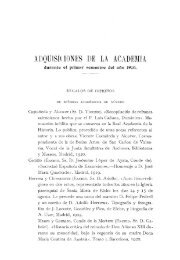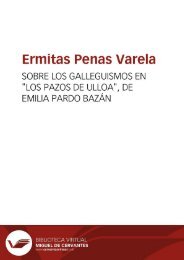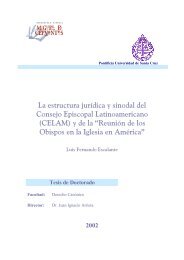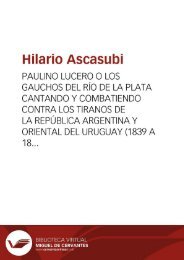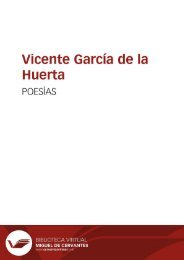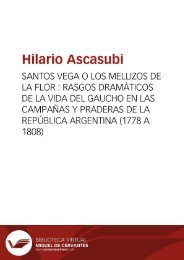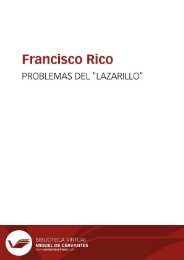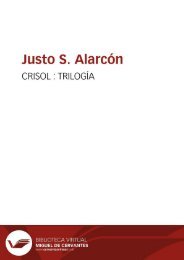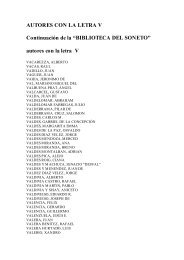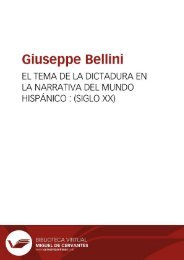Create successful ePaper yourself
Turn your PDF publications into a flip-book with our unique Google optimized e-Paper software.
Anales galdosianos [Publicaciones periódicas]. Año XII, 1977<br />
mis ojos » (XVI, 100); and he recognizes how easy it is to portray an individual's unchanging traits<br />
variably as defects or perfections. Moreover, he is confused by the tension between his powers of<br />
observation and artistic dictates. After Irene's attack of hysteria and fever, he asks: « ¿La debilidad<br />
y la pena aumentan su belleza o la destruyen casi por completo? ¿Está interesantísima, tal como el<br />
convencionalismo plástico exige, o completamente despoetizada? » (XL, 252) 139 . <strong>Galdós</strong>, Manso,<br />
art, nature, society: whose is the guiding hand here? Manolo's (mis)use of his education to join the<br />
ranks of the petty bourgeoisie is an act of independence or of rebellion, depending on the vantage<br />
point; in any event, a destruction of the mold in which he had been cast. As for Irene, her revelation to<br />
Manso of her true character is her profession of autonomy. There is no rebellion in her case: « ¡Error<br />
de los errores! » (XLII, 266): Manso's ideal Irene simply crumbles as she assumes a form at variance<br />
with the one he had imagined for her.<br />
Here is a man who lives by order and by reason's absolute law, who boasts of method in his every<br />
act and defines life as a solemn plan, yet cannot control his creations. Small wonder, then, that he<br />
is given to self-doubt. When, contrary to all his habits and at Manolo's insistence, he finds himself<br />
confronting some churros and brandy in a « buñolería », he muses: « ¿Quién se llamará dueño<br />
de sí ? » (XX, 119). It would appear that the individual has so little sway over his order (whether it<br />
is social, ontological, or fictional) that the order imposes itself on him even though he has created it.<br />
Several times in the novel's pages Manso confesses himself to be his creations' creation and inferior<br />
to them 140 . So formed by his pupil is he that for a moment he rebels against analysis and knowledge<br />
and exalts the man of action over his own ways. Of Irene he says: « La que fue maestra de niños<br />
después lo había sido mía en ciertas cosas », and he imagines her echoing: « Las maestras de escuela<br />
139 Manso reveals, as omniscient creator, that he knows how the story of Manolo and Irene is to<br />
end; but then he feels sorry for himself because his role in its denouement is not clear to him: « ¿Me<br />
correspondía intervenir en ella, o, por el contrario, debería yo evadirme lindamente dejando que los<br />
criminales se arreglaran como pudieran?... ¡Pobre Manso! » (XLI, 258). Whether he is pawn of the<br />
action or its guiding force or simply withdraws (dies) depends on whether he plays character and<br />
participant or creator or narrator.<br />
140 In an intelligent article that does not touch on the question of Manso's fictionality («<strong>Galdós</strong>' El<br />
amigo Manso : An Experiment in Didactic Method», Bulletin of Hispanic Studies , 39 [1962], 16-30),<br />
G.R. Davies singles out the « buñolería » scene as an example of Manso's distanced state from the<br />
political and social realities of life and his inferiority, in this respect, to his own pupil.<br />
102





